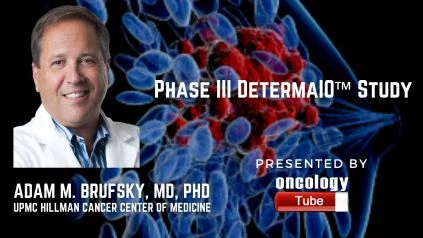Adam M. Brufsky, MD, Ph.D., Professor of Medicine, Associate Chief, Division of Hematology/Oncology, Co-Director, Comprehensive Breast Cancer Center, Associate Director, Clinical Investigation at Magee-Womens Cancer Program, part of the UPMC Hillman Cancer Center of Medicine speaks about the Phase III DetermaIOâ„¢ Study.
Description in detail:
Mononuclear cells and lymphocytes have been found in numerous triple negative and basal-like breast tumors, according to new research. Regardless of the kind of tumor invasion by mononuclear cells, immune regulatory checkpoints like PD-1 and its ligand B7-H1 (or PD-L1) have a deleterious impact on treatment outcomes. These findings imply that PD-L1 expression is an adaptive strategy of tumor resistance to tumor infiltrating lymphocytes, which are required for chemotherapy response in a subset of patients. Overall, the findings support the idea that blocking immunological checkpoints may favor the achievement of a long-lasting response by immune mechanisms alone, or in combination with traditional chemotherapy.
MPDL3280A (atezolizumab) is a human monoclonal antibody that targets PD-L1 and prevents binding of its receptors, including PD-1 and B7.1. It has an altered Fc-domain to improve efficacy and safety. We want to perform a trial of the combination of abraxane and carboplatin with or without PDL1-directed antibody in women with locally advanced breast cancer who are candidates for neoadjuvant therapy, with the goal of improving event-free survival.

